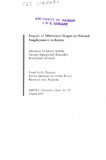| dc.contributor.author | Manda, Damiano Kulundu | |
| dc.contributor.author | Kosimbei, George Kipng' etich | |
| dc.contributor.author | Wanjala, Bernadette | |
| dc.date.accessioned | 2013-06-21T15:24:28Z | |
| dc.date.available | 2013-06-21T15:24:28Z | |
| dc.date.issued | 2007-03 | |
| dc.identifier.uri | http://hdl.handle.net/11295/37799 | |
| dc.description | KIPPRA Discussion Paper No. 67 | en |
| dc.description.abstract | This paper uses time series data to analyze the impact of minimum wages
on employment in the private and public formal sectors in Kenya. An error
correction model is used to analyse the long-run and short-run effect of
minimum wage on employment in the two sectors. The results show that
minimum wage has a significant negative effect on employment in theformal
public sector, both in the short-run and long-run. However, in the private
sector, minimum wage has a positive significant effect on employment in
the long-run but has no effect on employment in the short-run. Increase in
real average wage has a negative effect on employment in the private sector.
The results also show that both negaiioe and positive shocks on the economy
have an impact on employment. The model shows that short-run
disturbances feed into the long-run employment path. The results imply
that it is the cumulative effect of minimum wage that has an impact on
employment. Thus, limiting the frequency of adjusting minimum wage
upwards, such as changing minimum wage after two years instead of
changing it every year as currently the practice in Kenya can help minimize
the negative impact of minimum wage on employment. | en |
| dc.language.iso | en | en |
| dc.publisher | University of Nairobi, | en |
| dc.title | Impact of Minimum -Wages on Formal Employment in Kenya | en |
| dc.type | Working Paper | en |
| local.publisher | Institute of Development Studies (IDS) | en |

